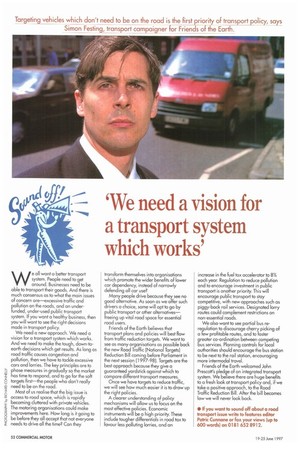'We need a vision for a transport system which works'
Page 54

If you've noticed an error in this article please click here to report it so we can fix it.
Targeting vehicles which don't need to be on the road is the first priority of transport policy, says Simon Festing, transport campaigner for Friends of the Earth.
We all want a better transport system. People need to get around. Businesses need to be able to transport their goods. And there is much consensus as to what the main issues of concern are—excessive traffic and pollution on the roads, and an underfunded, under-used public transport system. If you want a healthy business, then you will want to see the right decisions made in transport policy.
We need a new approach. We need a vision for a transport system which works. And we need to make the tough, down-toearth decisions which get results. As long as road traffic causes congestion and pollution, then we have to tackle excessive cars and lorries. The key principles are to phase measures in gradually so the market has time to respond, and to go for the soft targets First—the people who don't really need to be on the road.
Most of us realise that the big issue is access to road space, which is rapidly becoming cluttered with private vehicles. The motoring organisations could make improvements here. How long is it going to be before they all accept that not everyone needs to drive all the time? Can they transform themselves into organisations which promote the wider benefits of lower car dependency, instead of narrowly defending all car use? Many people drive because they see no good alternative. As soon as we offer such drivers a choice, some will opt to go by public transport or other alternatives— freeing up vital road space for essential road users.
Friends of the Earth believes that transport plans and policies will best flow from traffic reduction targets. We want to see as many organisations as -aossible back the new Road Traffic (Nationa Targets) Reduction Bill coming before Parliament in the next session (1997-98). Targets are the best approach because they give a guaranteed yardstick against which to compare different transport measures. Once we have targets to reduce traffic, we will see how much easier it is to draw up the right policies. A clearer understanding of policy mechanisms will allow us to focus on the most effective policies. Economic instruments will be a high priority. These include tougher differentials in road tax to favour less polluting lorries, and an increase in the fuel tax accelerator to 8% each year. Regulation to reduce pollution and to encourage investment in public transport is another priority. This will encourage public transport to stay competitive, with new approaches such as piggy-back rail services. Designated lorry routes could complement restrictions on non-essential roads.
We also want to see partial bus reregulation to discourage cherry picking of a few profitable routes, and to foster greater co-ordination between competing bus services. Planning controls for local authorities should encourage the bus station to be next to the rail station, encouraging more intermodal travel_ Friends of the Earth welcomed John Prescott's pledge of an integrated transport system. We believe there are huge benefits to a fresh look at transport policy and, if we take a positive approach, to the Road Traffic Reduction Bill. After the bill becomes law we will never look back.
• If you want to sound off about a road transport issue write to features editor Patric Cunnane or fax your views (up to 600 words) on 0181 652 8912.






















































































































